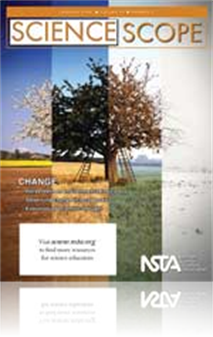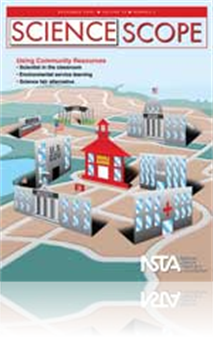All Science Scope resources
Journal Article
Science Sampler: Made to measure—Teaching the skill of estimation
Estimation is an important skill that we all use every day, often without realizing it. It might not seem very scientific, because we think of science as being accurate and precise—surely estimating is just a form of guessing. It seems unpredictabl...
Journal Article
Editor’s Roundtable: Threads of change
Egg, larva, pupa, adult, done! How easy it would be if teaching students to grasp the nature and role of change was that simple! Getting students to observe and attend to the changes around them—in their natural surroundings and in the laboratory�...
Journal Article
Scope on the Skies: International Year of Astronomy
This year marks the 400th anniversary of when a telescope was used for astronomical observations, and 2009 has also been designated the International Year of Astronomy—a yearlong celebration of astronomy through various events and activities both o...
Journal Article
Clarifying ancient environments millions of years ago is necessary to better understand how ecosystems change over time, providing insight as to the potential impacts of current global warming. This module engages middle school students in the scient...
Journal Article
Scope on Safety: Allergies—Nothing to sneeze at
The list from the nurse’s office of students with known allergies seems to get longer each year. Allergy symptoms can range from a simple red rash or itch to life-threatening anaphylactic shock. Interestingly enough, peanuts and tree nuts account f...
Journal Article
Tried and True: Modeling changes in matter, magnifying interest in science
At Daniell Middle School in Marietta Georgia, students’ interest in science and understanding of matter has been magnified. This is due, at least in part, to science faculty, who are convinced that a hands-on, inquiry approach to science can stimul...
Journal Article
Scope on the Skies: Mars at opposition
On January 29, Mars will reach opposition, a point along its orbit around the Sun where Mars will be directly opposite from the Sun in a two-planet and Sun line-up with the Earth in between. At this opposition, the Earth and Mars will be separated by...
Journal Article
Editor’s Roundtable: What students can learn in their own backyard
Local resources and potential science education partners are underutilized, though many facilities, institutions, and professionals would gladly volunteer time and services to schools and teachers. This issue of Science Scope offers a collection of a...
Journal Article
Digging Into Inquiry-based Earth Science Research
To help eighth-grade students experience the excitement of Earth science research, the authors developed an inquiry-based project in which students evaluated and cataloged their campus geology and soils. Following class discussions of rock-weathering...
Journal Article
This project-based science unit, focused on a local environmental issue, created a great deal of interest and learning, as well as drew in the support of the community. The authors designed and implemented the project in a fifth- and sixth-grade clas...
Journal Article
Guest Editorial: The polished rock
Saving the world is a pretty lofty goal. One that sounds so unattainable that most of us instinctively want to leave that up to the physicists, the brain surgeons, the chemists, and the environmental researchers. You know, the people who have enough ...
Journal Article
Conference attendees arrive at the registration desk at 9:00 a.m. sharp, eager to start their day. While standing in line, they talk excitedly about the sessions they’ve chosen to see, the original investigation they’ll be presenting, off-site fi...
Journal Article
Science Sampler: Science role models for adolescent girls
Research shows that girls are more likely to enter a field when they can identify a role model in that field (Betz 1994; Lent, Brown, and Hackett 1994). But the authors found that little is known about what it really takes to be a science role model ...
Journal Article
Tried and True: An Eggciting Alternative to a Science Olympiad
This is a new twist on a familiar Science Olympiad event. By combining two possible outcomes, it allows students to make choices in an inquiry format. Students must think about materials, Newton’s first and second laws of motion, kinetic energy, an...
Journal Article
Scope on the Skies: Lunar looks and latitude
During December, the Sun gains a bit of notoriety as its celestial position this month marks a change of seasons, a solstice. The word solstice describes the day, or moment, when the Sun stops its north or south apparent motion. This month, the Sun r...




